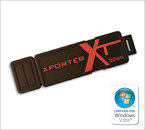Saturday, October 27th 2007
Patriot Releases 32GB Xporter XT Boost USB Drive
Patriot Memory recently announced a 32GB version to their Xporter XT Boost line (PEF32GUSB). The USB drive has read speeds of up to 150x, which makes it one of the fastest USB Flash Drives in the market. It is also certified for Windows Vista and is ReadyBoost compliant. The 32GB Xporter XT Boost is designed with a rubber water resistant housing making it reliable for users to transport. Just in case anything happens, it is backed by a lifetime warranty.
Source:
Patriot Memory

40 Comments on Patriot Releases 32GB Xporter XT Boost USB Drive
follow the link 87.18 @ buy.com
Wow, sometimes I really wonder about you all.
Just because you have a large USB drive doesnt mean its faster than your hard drive.
Last time I checked, USB had like a theoretical maximum transfer speed of like 100mb/sec, not exactly ideal...
I have looked at those solutions where u can use ram as an HDD's (forgotten the name) ... but that still gets whipped by a decent raid 0 setup...
well one things for certain... they cant engineer a spinning HDD any better than it already is... so the only next logical step is solid state and perhaps a new type of bus thats fast enough to support it and deliver it where it needs to be without slowing down other components
They are improving drives as we speak by implementing technologies along the lines of perpendicular recording etc, all involved in getting more data density on hard drive platters. Though of course, one day solid state will become the norm, at the moment it isnt a very lucrative technology. It is currently alot more expensive per gigabyte, and the speeds dont thrash our existing drives.
The current advantages of SSD is low latency, quiet and cool nature of the drives (low power drain).
Disadvanges - Slower streaming of data, electromagnetic vulnerability, succeptibility to corruption from sudden power loss, lots more expensive per gig and data recoverability (once its deleted/corrupted/lost its gone forever).
Thats the current situation as to why they arnt mainstream. Though the future looks bright :)
so it takes up 1 space but doubles the speed internally... mmmm thats a thought..
still a drive can only spin so fast.. and it does slow a pc down...
jack.abyssmal.com/photo/RRamdisk_IOMeter-001.png
havent really kept up to date with that side of tech lately hehe
so many side to watch hehe!
(been focussing on GFX and CPU's in my spare time mainly)
Read this www.storagesearch.com/easyco-flashperformance-art.pdf
got through the first two paragraphs and it lost my tired concentration span :D
(of which even awake and refreshed is that of a small single celled organism)
for now im down 8 beers, half awake and busting for the loo... hope i make it down the stairs! ;)
It sort of makes sense though. That would prove why SSD is faster at reading than HDDs, though it is slower than writing data. SO I guess its sort of a balancing act between the two.
Maybe thats why I heard somewhere that they were planning on making hybrid drives, a mix of SSD and regular Hard drives...
well what i was wondering is why... (since they already make drive with multiple platters/disks) they dont make a half sized drive... where lets say out of 4 platters you get 2/2 acting as raid 0
that would double the speed as in raid.... and youd have it on the drive itself meaning that it dosent get affected by the controller maximum speed.
The circumference of the disk would be smaller. And therefore the outside edge of the disk would be moving slower.
forums.techpowerup.com/showthread.php?t=34311&page=2
Read from post 27 onwards.Whats your point? Its still limited to the bandwidth of the USB port anyway.
The reason I posted info on flash based SSD is because we are talking about a USB device, not one located on the PCI bus.
i was saying that you can basically use this a flash hard drive and install and os and all on it, and so that way it'd act like a portable ssd drive. ssd is what they call the flash hard drives right?